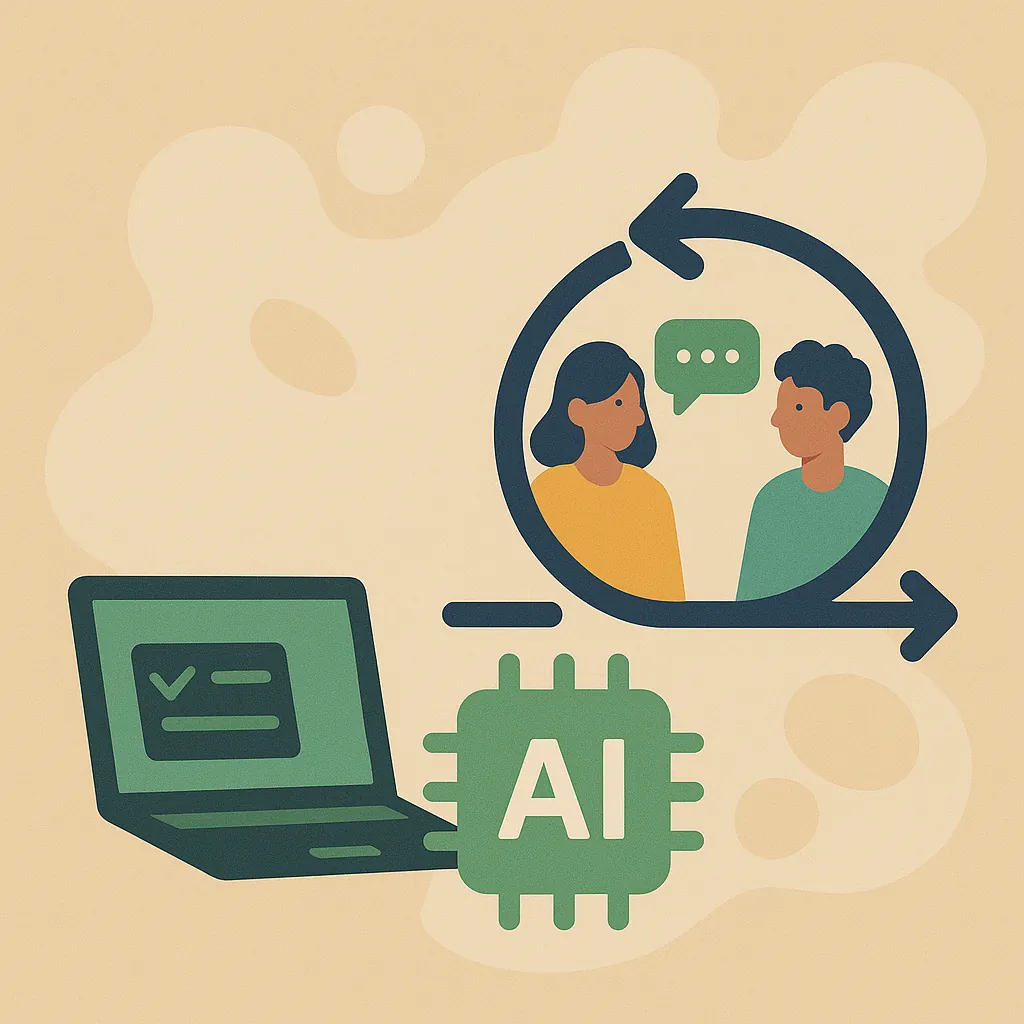Introduction
The Scrum methodology has emerged as a pivotal framework that promotes agility, collaboration, and efficiency among teams. Scrum is designed to facilitate iterative development, allowing teams to respond swiftly to changing requirements and deliver high-quality products. By breaking projects into manageable increments, Scrum fosters a culture of continuous improvement and encourages regular feedback, making it an essential approach for tech innovators and Agile teams striving for excellence in their projects.
As industries evolve, the integration of Artificial Intelligence (AI) has begun to reshape the landscape of project management. AI technologies are revolutionizing how organizations operate by automating processes, enhancing decision-making, and providing insights that were previously unattainable. The transformative impact of AI is evident across various sectors, from healthcare to finance, and now, it is making significant inroads into project management practices.
Combining AI with Scrum tools presents a unique opportunity to enhance productivity and collaboration within Agile teams. AI can streamline processes by analyzing historical data to improve sprint planning, optimize resource allocation, and facilitate real-time communication among team members. This integration not only empowers Scrum Masters to make data-driven decisions but also enhances the overall effectiveness of the Scrum framework. By leveraging AI technologies, Agile teams can unlock new levels of efficiency, ensuring that they remain competitive in an increasingly fast-paced and complex business environment.
In this blog section, we will explore the best Scrum software options that incorporate AI capabilities, highlighting how these tools can drive successful project outcomes and foster a culture of innovation within tech-savvy organizations.
Understanding Scrum Software
Scrum software plays a pivotal role in the Agile project management landscape, providing teams with the tools necessary to implement Scrum methodologies effectively. As organizations increasingly adopt Agile practices, understanding the core functionalities of Scrum software becomes essential for enhancing productivity and collaboration.
Primary Features of Scrum Software
- Backlog Management: One of the fundamental features of Scrum software is backlog management, which allows teams to prioritize and manage their work items efficiently. This feature ensures that the most critical tasks are addressed first, aligning with the Agile principle of delivering value incrementally [9].
- Sprint Planning: Scrum software facilitates sprint planning by enabling teams to define the scope of work for each sprint. This includes selecting items from the product backlog, estimating effort, and assigning tasks to team members. Effective sprint planning is crucial for maintaining focus and ensuring that teams meet their goals within the designated time frame [12].
- Progress Tracking: Many Scrum tools offer visual dashboards and reporting features that help teams track their progress throughout the sprint. This includes burn-down charts, velocity tracking, and other metrics that provide insights into team performance and project status [14].
- Collaboration Tools: Scrum software often includes features that enhance team collaboration, such as integrated communication tools, file sharing, and real-time updates. These functionalities help maintain transparency and foster a collaborative environment, which is essential for Agile teams [12].
- Integration with Other Tools: Modern Scrum software frequently integrates with other project management and development tools, such as GitHub or Jira. This integration streamlines workflows and ensures that all team members have access to the information they need to work effectively [2].
Role of Scrum Software in Facilitating Agile Practices
Scrum software is designed to support Agile practices by promoting self-organization and accountability within teams. By providing a structured framework for managing tasks and workflows, these tools help teams adhere to Agile principles, such as iterative development and continuous improvement. The software enables teams to respond quickly to changes, adapt their plans based on feedback, and deliver high-quality products more efficiently [9][14].
Moreover, Scrum software enhances communication among team members, ensuring that everyone is aligned on project goals and progress. This alignment is crucial for fostering a culture of collaboration and innovation, which is at the heart of Agile methodologies [12].
Challenges Faced by Teams Using Traditional Scrum Software
Despite the advantages of Scrum software, teams often encounter challenges when using traditional tools. Some of these challenges include:
- Limited Flexibility: Traditional Scrum software may lack the flexibility needed to adapt to the unique workflows and processes of different teams. This rigidity can hinder a team’s ability to customize their approach to Scrum, leading to inefficiencies [1].
- Difficulty with Self-Management: Scrum teams are expected to be self-organizing, but traditional tools may not fully support this autonomy. Teams may struggle with self-management if the software does not provide adequate visibility into workloads and progress [1].
- Integration Issues: Many teams use a variety of tools for different aspects of project management. Traditional Scrum software may not integrate well with these tools, leading to fragmented workflows and communication breakdowns [2].
- User Experience: Some traditional Scrum tools can be complex and difficult to navigate, which may discourage team members from fully utilizing the software. A poor user experience can lead to decreased productivity and engagement [12].
The Role of AI in Project Management
Artificial Intelligence (AI) is transforming the landscape of project management, particularly within Scrum methodologies. By integrating AI technologies into Scrum software, teams can enhance productivity, streamline collaboration, and make more informed decisions. Here are some key points outlining the capabilities of AI and its impact on project management.
Capabilities of AI in Project Management
- Data Analysis: AI excels in processing vast amounts of data quickly and accurately. It can analyze historical project data to identify trends, patterns, and potential pitfalls, enabling teams to make data-driven decisions. This capability is crucial in Scrum, where iterative processes rely heavily on feedback and continuous improvement [1].
- Predictive Modeling: AI can forecast project outcomes by utilizing predictive analytics. For instance, it can estimate task durations based on past performance data, helping teams plan sprints more effectively. This predictive capability allows Scrum teams to allocate resources more efficiently and anticipate challenges before they arise [11].
- Automation: Routine tasks such as status updates, reporting, and task assignments can be automated through AI. This automation not only saves time but also reduces the likelihood of human error, allowing team members to focus on more complex and strategic aspects of their projects [15].
Impact of AI on Decision-Making Processes
AI significantly enhances decision-making processes in project management by providing insights that were previously difficult to obtain. With AI tools, Scrum teams can:
- Make Informed Choices: By analyzing data and generating insights, AI helps teams understand the implications of their decisions, leading to better outcomes. For example, AI can suggest optimal team member assignments based on individual performance metrics, ensuring that the right skills are applied to the right tasks [11].
- Enhance Collaboration: AI tools can facilitate communication and collaboration among team members by providing real-time updates and insights. This ensures that everyone is on the same page and can contribute effectively to the project goals [14].
Examples of AI Applications in Project Management
AI is not limited to Scrum software; it has applications across various project management tools:
- Jira: This popular tool incorporates AI features that assist in tracking issues and managing workflows, making it easier for teams to adapt to changes and maintain productivity [2].
- Asana: Asana utilizes AI to improve task management and project tracking, enhancing team collaboration and ensuring that deadlines are met [5].
- ClickUp: This all-in-one project management software integrates AI capabilities to streamline processes and optimize resource management, making it a valuable tool for Agile teams [6].
- Wrike: With its AI functionalities, Wrike helps teams organize work and collaborate effectively, allowing for better project oversight and management [14].
Integrating AI into Scrum Software
The integration of Artificial Intelligence (AI) into Scrum software is transforming how Agile teams operate. By leveraging advanced technologies, Scrum tools can enhance productivity, streamline collaboration, and provide actionable insights. Here are some key AI technologies that are making a significant impact on Scrum software functionalities:
Natural Language Processing (NLP) for Improved Communication and Feedback
Natural Language Processing (NLP) is a branch of AI that focuses on the interaction between computers and human language. In the context of Scrum software, NLP can be utilized to:
- Enhance Communication: NLP tools can analyze team communications, extracting key insights and sentiments from discussions. This helps Scrum Masters and team members understand the overall mood and engagement levels within the team, facilitating better interpersonal dynamics.
- Automate Feedback Collection: By using NLP, Scrum tools can automate the process of gathering feedback from team members during retrospectives. This not only saves time but also ensures that all voices are heard, leading to more comprehensive insights for continuous improvement.
- Facilitate Documentation: NLP can assist in summarizing meeting notes and action items, making it easier for teams to track progress and follow up on commitments.
Machine Learning Algorithms for Project Forecasting and Resource Management
Machine learning (ML) algorithms are powerful tools that can analyze historical data to make predictions about future project outcomes. In Scrum software, ML can be applied in several ways:
- Project Forecasting: By analyzing past sprint data, ML algorithms can predict the likelihood of meeting deadlines and achieving project goals. This allows teams to make informed decisions about resource allocation and timeline adjustments.
- Resource Management: ML can optimize resource allocation by analyzing team members’ workloads, skills, and availability. This ensures that tasks are assigned to the most suitable individuals, enhancing overall team efficiency and productivity.
- Risk Assessment: Machine learning can identify potential risks by analyzing patterns in project data, enabling teams to proactively address issues before they escalate.
Identifying Bottlenecks and Optimizing Workflows
AI technologies can play a crucial role in identifying bottlenecks within Scrum processes and optimizing workflows:
- Real-Time Monitoring: AI tools can monitor project progress in real-time, detecting delays or inefficiencies in workflows. By providing immediate feedback, these tools enable teams to address issues as they arise, maintaining momentum throughout the project lifecycle.
- Data-Driven Insights: AI can analyze workflow data to identify recurring bottlenecks, such as tasks that consistently take longer than expected. This information allows teams to implement targeted improvements, streamlining processes and enhancing overall productivity.
- Automated Task Management: AI can automate routine tasks, freeing up team members to focus on higher-value activities. By reducing the administrative burden, teams can concentrate on delivering quality outcomes and fostering innovation.
Benefits of AI-Enhanced Scrum Software
The integration of Artificial Intelligence (AI) into Scrum software is revolutionizing the way Agile teams operate, providing a multitude of benefits that enhance productivity and collaboration. Here are some key advantages of utilizing AI-enhanced Scrum tools:
- Increase in Productivity through Automated Task Management: AI technologies streamline task management by automating repetitive processes, allowing team members to focus on more strategic activities. This automation not only saves time but also reduces the likelihood of human error, ensuring that tasks are completed efficiently and accurately. By leveraging AI algorithms, teams can prioritize tasks based on urgency and importance, leading to a more organized workflow and increased overall productivity [6][15].
- Enhanced Collaboration with Improved Communication Tools and Insights: AI-integrated Scrum software often includes advanced communication tools that facilitate better collaboration among team members. These tools can analyze communication patterns and provide insights that help teams understand how to work together more effectively. For instance, AI can identify bottlenecks in communication and suggest improvements, fostering a more cohesive team environment. This enhanced collaboration is crucial for Agile teams, as it allows for quicker feedback loops and more effective problem-solving [9][10].
- Data-Driven Decision-Making Leading to Better Sprint Outcomes: One of the most significant advantages of AI in Scrum software is its ability to harness data for informed decision-making. AI can analyze historical project data to provide insights into team performance, sprint velocity, and potential risks. This data-driven approach enables Scrum Masters and team leaders to make better predictions about future sprints, optimize resource allocation, and mitigate risks before they escalate. As a result, teams can achieve better sprint outcomes and deliver higher-quality products [3][14].
Case Studies: Successful AI Integration in Scrum Tools
The integration of AI technologies into Scrum software has proven to be a game-changer for many organizations, enhancing productivity and collaboration among Agile teams. Below are several case studies that illustrate how companies have successfully implemented AI in their Scrum processes, the results they achieved, and the lessons learned from their experiences.
1. Blue Flash: Transforming Scrum Practices
Overview: Blue Flash, a tech company, undertook a significant transformation by adopting Scrum practices enhanced with AI tools.
Implementation:
- The company focused on training its teams in Scrum methodologies while restructuring teams to better align with Agile principles.
- AI was integrated to automate routine tasks and provide data-driven insights during retrospectives.
Results:
- Post-implementation, Blue Flash reported a marked improvement in delivery times and team collaboration.
- The AI tools helped in identifying bottlenecks in the workflow, leading to more efficient sprint planning and execution.
Lessons Learned:
- Continuous feedback from team members was crucial in refining AI features to better meet their needs.
- The importance of training and support during the transition to AI-enhanced Scrum practices was emphasized, ensuring that all team members were on board with the changes [2][8].
2. AI-Driven Insights at Tech Innovators Inc.
Overview: Tech Innovators Inc. integrated AI into their Scrum processes to enhance decision-making and improve project outcomes.
Implementation:
- The company utilized AI tools to analyze sprint data and generate visual reports, which provided insights into team performance and project progress.
- AI was also employed to facilitate daily stand-ups by summarizing previous discussions and highlighting key action items.
Results:
- The integration led to a 30% increase in team productivity, as members spent less time on administrative tasks and more on value-adding activities.
- Enhanced visibility into project metrics allowed for better forecasting and resource allocation.
Lessons Learned:
- The need for a cultural shift within the organization was identified, as team members had to adapt to relying on AI-generated insights.
- Regular training sessions were essential to ensure that all team members could effectively use the new tools and understand the data presented [4][14].
3. Agile Solutions: Leveraging AI for Enhanced Collaboration
Overview: Agile Solutions, a consultancy firm, adopted AI technologies to improve collaboration among distributed teams.
Implementation:
- AI was integrated into their Scrum software to facilitate communication and collaboration across different locations.
- Tools were developed to analyze team interactions and suggest improvements in communication patterns.
Results:
- The company observed a significant reduction in miscommunication and an increase in team cohesion, leading to more effective sprint outcomes.
- AI-driven recommendations helped teams to adjust their workflows based on real-time feedback, enhancing overall performance.
Lessons Learned:
- The importance of fostering an open culture where team members felt comfortable sharing feedback about AI tools was highlighted.
- Iterative improvements based on team feedback were crucial for maximizing the benefits of AI integration [5][10].
Challenges and Considerations
Integrating AI technologies into Scrum software can significantly enhance productivity and collaboration within Agile teams. However, it is essential to recognize and address the potential challenges that may arise during this implementation. Here are some key considerations:
- Resistance from Team Members: One of the primary challenges in adopting AI in Scrum tools is the potential resistance from team members. Many individuals may feel apprehensive about AI technologies, fearing that these tools could replace their roles or diminish their contributions. This resistance can stem from a lack of understanding of AI capabilities or concerns about job security. To mitigate this, it is crucial to foster an environment of open communication, where team members can express their concerns and receive education about the benefits of AI in enhancing their work rather than replacing it [7][10].
- Data Privacy and Security Issues: The use of AI in Scrum software raises significant data privacy and security concerns. AI systems often require access to large volumes of data to function effectively, which can include sensitive project information and personal data of team members. Organizations must ensure that they comply with data protection regulations and implement robust security measures to safeguard this information. This includes conducting regular audits, employing encryption techniques, and ensuring that AI algorithms are designed with privacy in mind [5][15].
- Strategies for Effective Implementation and Team Training: To successfully integrate AI into Scrum software, organizations should develop comprehensive strategies that include effective implementation and team training. This can involve:
- Incremental Adoption: Gradually introducing AI tools to the team can help ease the transition and allow members to adapt to new workflows without feeling overwhelmed.
- Training Programs: Providing training sessions that focus on how to use AI tools effectively can empower team members and enhance their confidence in utilizing these technologies. This training should cover not only the technical aspects but also the strategic advantages of AI in project management [9][11].
- Feedback Mechanisms: Establishing channels for ongoing feedback can help teams voice their experiences and concerns regarding AI tools, allowing for continuous improvement and adaptation of the technology to better meet their needs [10][14].
By addressing these challenges and implementing thoughtful strategies, Agile teams can harness the full potential of AI in their Scrum software, ultimately leading to improved productivity and collaboration.
Future Trends in AI and Scrum Software
The integration of artificial intelligence (AI) into Scrum software is poised to revolutionize how Agile teams operate. Here are some key trends and implications for the future of AI in Scrum tools:
- Emerging AI Trends: The integration of AI technologies into Scrum software is expected to enhance decision-making processes through predictive analytics. By analyzing historical data, AI can provide insights that help teams make more accurate estimates regarding task completion times and project timelines. This capability not only improves predictability but also aids in optimizing backlog prioritization, allowing teams to focus on the most valuable tasks first [6][12].
- Increased Automation: One of the most significant advancements anticipated in Scrum software is the automation of routine project management tasks. As AI technologies become more sophisticated, it is projected that up to 80% of project management tasks will be automated by 2025. This shift will streamline workflows, reduce the burden of repetitive tasks on team members, and allow them to concentrate on higher-value activities that require human creativity and strategic thinking [9][14]. Automation will also enhance stakeholder management by providing more efficient and transparent communication channels, ultimately leading to better project outcomes [4].
- Smarter Analytics: The future of Scrum software will likely see the incorporation of advanced analytics capabilities powered by AI. These tools will not only analyze data but also provide actionable insights that can guide teams in their decision-making processes. For instance, AI can identify patterns and trends that may not be immediately apparent to human analysts, thereby improving risk management and enabling proactive adjustments to project plans [13]. This level of insight will empower Agile teams to adapt quickly to changing circumstances and make informed decisions that enhance project success rates [5].
- Continuous Adaptation and Learning: In the Agile framework, continuous improvement is a core principle. The integration of AI into Scrum tools will facilitate this by providing teams with real-time feedback and learning opportunities. As AI systems learn from ongoing projects, they can offer tailored recommendations that help teams refine their processes and practices. This adaptability is crucial in a fast-paced environment where project requirements and market conditions can change rapidly [7][11].
Conclusion
The integration of Artificial Intelligence (AI) into Scrum software has emerged as a transformative force, enhancing productivity and collaboration among Agile teams. The benefits of incorporating AI into Scrum processes are manifold:
- Increased Efficiency: AI tools streamline various Scrum activities, from facilitating meetings to summarizing decisions and actions, allowing teams to focus on strategic and creative tasks rather than administrative burdens. This shift not only accelerates project delivery but also fosters innovation and rapid iteration within smaller teams [2][7].
- Data-Driven Insights: AI technologies provide valuable insights into team metrics, performance trends, and potential bottlenecks. By leveraging these insights, teams can make informed decisions that enhance their workflow and overall project outcomes [9].
- Continuous Improvement: The Agile methodology, with its emphasis on adaptability and iterative development, aligns seamlessly with AI capabilities. This synergy ensures that teams can pivot quickly in response to changes, continuously improving their models and systems [3][6].
As tech innovators and Agile teams navigate the complexities of modern project management, exploring AI solutions can unlock new levels of efficiency and collaboration. The potential for AI to revolutionize Scrum practices is significant, and teams are encouraged to embrace these technologies to stay ahead in a competitive environment.
Find out more about Shaun Stoltz https://www.shaunstoltz.com/about/.
This post was written by an AI and reviewed/edited by a human.



